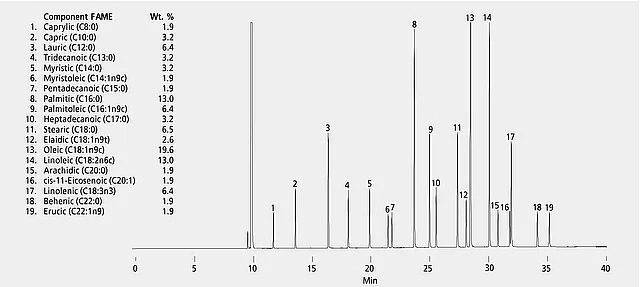What is Gas Liquid Chromatography? The various areas where Gas chromatography analysis is required
Volatile components are separated by this analytical technique which is used for the identification of chemical components. After separation of the components, we can determine the purity and impurities present. GLC or GC technique is used for testing of most volatile liquids and solvents. Many powders, chemicals, oils can also be tested by this technique by dissolving them in a solvent and then carrying out the testing. A typical test of Gas Liquid Chromatography will show the peaks, retention time and area percentage which looks like a chromatogram and since it in a liquid phase it is called as Gas Liquid Chromatography.

GAS LIQUID CHROMATOGRAPHY TESTING AND ANALYSIS
ATLAS LAB provides a diverse range of Gas Chromatography testing like :
Solvents :
Solvents like Ethanol, Methanol, Acetone, etc. are tested for their purity. From their retention and elution time we provide accurate information regarding the identification of the components right from percentage to sub percentage level. Impurities present are calculated by the GLC instrument and are shown in the chromatogram as minor or major peaks.
Fatty Acid Methyl Esters – FAME :
Analysis of Fatty Acid Methyl Esters or FAME or Fatty Acid Profiling consist of separation of the fatty acids in Edible Oils, Vegetable Oils, Fatty Acids, Lard, Ghee, Butter, Vanaspati, etc. for identification and quantification of the fatty acids present. Each oil has a unique fingerprint or graph or assigned percentage of fatty acids present in them. Hence on conducting the Gas Liquid Chromatography – GLC Testing each oil will elute a unique chromatogram from which our experienced chemists can easily identify the purity of the oil with precise peak identification and ascertain the level of mixing and adulteration with other oils or fats. We can identify individual fatty acid, Saturated Fatty Acids, Unsaturated Fatty Acids, Monosaturated Fatty Acid, Polysaturated Fatty Acids, Trans Fatty Acids.

Adulteration in Edible Oils and Vegetable Oil :
As per the findings of FSSAI 24 % of the branded samples were found to be contaminated and up to 85 % of loose edible oil was found to be adulterated. Through Gas Chromatography we can easily detect if the oil or fat is adulterated.
Adulteration in Ghee :
Adulteration of Ghee may commence at the initial state – which is – the milk stage itself. The water emulsion of various oils like coconut, groundnut, palm olein and other oils are added to milk or cream and then mixed to make a frothy layer of butter which on heating and boiling converts to ghee. Hence Ghee is adulterated with Edible Oil, Vegetable Oil, Animal Fat, Lard, Mineral Fats, Flavouring and Colouring Agents and even Starch. A common adulterant is Vanaspati (hydrogenated fat). Though there are chemical methods for detection of adulterants in Ghee like Furfural method, Baudouin Test and B R Reading, the best method for detecting adulteration in Ghee is by Gas Liquid Chromatography.
Adulteration in Butter :
Butter is adulterated with different types of oils and fats, Starch, Wheat and Maize Dough, Irish Potato Puree, Liquid Tallow, Liquid Lard, Banana Pulp, Vanaspati (hydrogenated fat), Margarine and Soft Paraffin. This adulteration causes a serious health risk which could endanger life and cause life threatening illness. Through Gas Chromatography and Fatty Acid Profiling (FAME) Test we can detect if the Butter is adulterated and also estimate the level of mixing and adulteration.
Soap :
Soaps, Soap Noodles, also contain oil and fat. Through GLC testing we can ascertain and identify which oil is present so that the value of the soap is known. A manufacturer maybe selling his soap as Almond soap but maybe using palm oil instead.By testing the product through Gas Chromatography we can detect which oil or fat is used.
Halal Food Testing and Kosher Food Testing :
Certain religions prohibit the consumption of animal fat with food products. Muslim and Jewish religion and sentiment do not consume pig derivatives like pork and lard in their food. Hindu’s do not consume beef fats in their foods. The kosher (kashrus) dietary laws determine which foods are “fit or proper” for consumption by Jewish consumers who observe these laws.
Hence let it be Muslims, Jews, Hindu’s or many sects of people, the major concern lies in detecting the foods with adulterants which are forbidden and prohibited as per their religious belief and practices. There are many vegetarians who do not consume non vegetarian food. All this testing is done by ATLAS LAB by using Gas Liquid Chromatography (GLC) Technique.
Nutritional Facts / Nutritional Value :
Nutrition Facts or Nutritional Value of foods has become a very important fundamental requirement. Consumers before buying a product want to know the Nutrition of the product. In almost every food there is a fat content. This fat has to be extracted from the food by gravimetric method and thereafter by using Gas Chromatography method it is established as to how much Saturated Fat, Unsaturated Fat, Monosaturated Fat, Polysaturated Fat, Trans Fat is present. Even Cholesterol can be estimated by Gas Liquid Chromatography. Hence Gas Liquid Chromatography is a extremely useful tool in estimation of most of the ingredients of Nutrition Facts / Nutrition Value labelling. We at ATLAS LAB by using the Gas Liquid Chromatography (GC) method ensure Nutrition Labelling which are factual, accurate and verifiable.
For any further technical or commercial inquiry one can contact us on our website: www.atlaslab.in
Or on our email: contact@atlaslab.in
Or call on : +91 93214 24026
Or WhatsApp on :+91 93214 24026
Reference :
https://www.sciencedirect.com/topics/medicine-and-dentistry/gas-liquid-chromatography
https://www.wikidoc.org/index.php/Gas-liquid_chromatography
britannica.com/science/gas-chromatography
https://www.machinerylubrication.com/Read/352/gas-chromatography
https://www.broadlearnings.com/courses/gas-liquid-chromatography-glc/




